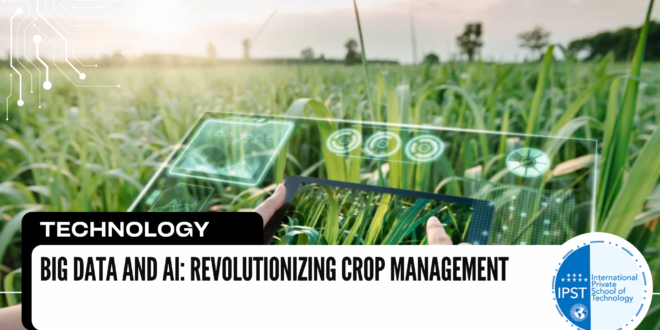Big Data and AI: Revolutionizing Crop Management
Big data and artificial intelligence (AI) are transforming the agricultural industry, particularly in crop management. By utilizing vast amounts of data, these technologies allow farmers to make better decisions, optimize resources, and improve productivity. The integration of AI and big data is leading to more efficient, sustainable, and data-driven farming practices.
Key Applications of Big Data and AI in Crop Management
1. Precision Agriculture
Precision agriculture involves using data to manage crops in a highly efficient way. Sensors, satellite imagery, and drones collect data on soil quality, weather patterns, and crop health. AI analyzes this information to offer recommendations on planting, irrigation, fertilization, and pest management. This leads to more productive farms and reduced waste.
2. Predictive Analytics for Improved Yields
AI-powered predictive analytics can forecast crop yields and monitor conditions such as pest infestations or droughts. This enables farmers to adjust their practices based on predictions, allowing them to mitigate risks and make proactive decisions for better yields.
3. Real-Time Crop Monitoring
With the help of drones, sensors, and satellite imagery, farmers can track their crops’ health in real-time. Big data platforms analyze the data collected to detect signs of disease, pest outbreaks, or nutrient deficiencies early, enabling farmers to address issues promptly before they cause significant damage.
Benefits of Big Data and AI in Crop Management
- Increased Efficiency – Automation of tasks such as irrigation and fertilization improves efficiency, allowing farmers to manage their crops more effectively.
- Cost Savings – By optimizing resources like water and fertilizers, AI and big data reduce waste and help farmers save money.
- Higher Yields – Data-driven decisions lead to better crop management practices, increasing crop yields and profitability.
- Sustainability – With more precise farming methods, these technologies promote sustainable practices that reduce the environmental impact of farming.
Challenges and Future of Big Data and AI in Agriculture
While big data and AI hold great promise, they come with challenges, including high initial investment, data privacy concerns, and the need for skilled personnel to interpret and apply the data. However, as the technology advances and becomes more affordable, it is expected that these systems will become more accessible to farmers of all sizes.
In the future, the widespread use of big data and AI will continue to shape the agricultural landscape, making farming more efficient, sustainable, and resilient to environmental challenges. These technologies will play a crucial role in feeding a growing global population while minimizing the impact on the planet.
 International Private School of Technology المدرسة الدولية الخاصة للتكنولوجيا Private School مدرسة خاصة للتكوين المهني
International Private School of Technology المدرسة الدولية الخاصة للتكنولوجيا Private School مدرسة خاصة للتكوين المهني


